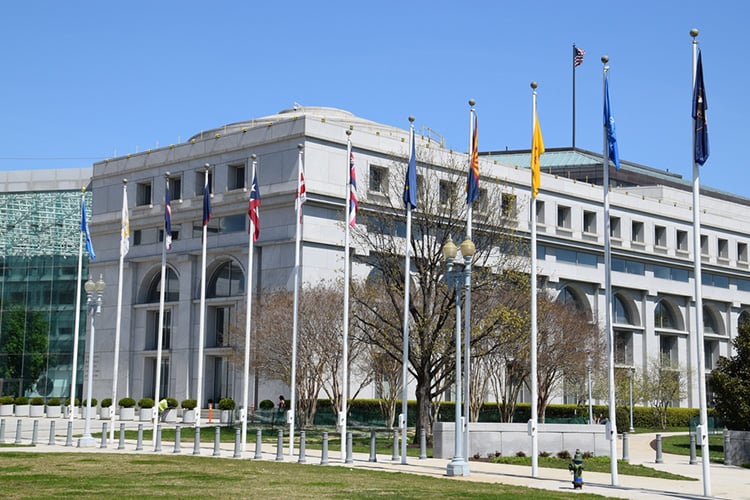Federal judges have a responsibility to report colleagues' harassing behavior, report says

Thurgood Marshall Federal Judiciary Building, Washington, D.C. Ritu Manoj Jethani / Shutterstock.com.
Inappropriate conduct is not pervasive in the federal judiciary, but it also not limited to “a few isolated incidents,” according to a report submitted to the Judicial Conference of the United States.
The working group that compiled the report was comprised of federal judges and senior court administrators, according to a news release.
In December, U.S. Supreme Court Chief Justice John G. Roberts directed the Administrative Office of the U.S. Courts to establish the group to examine the federal judiciary’s existing policies regarding inappropriate conduct. Roberts’ direction came less than two weeks after Judge Alex Kozinski announced his immediate retirement after six women who served as clerks or held externships on the San Francisco-based 9th U.S. Circuit Court of Appeals accused him of sexual harassment and the 9th Circuit initiated a misconduct complaint against him.
The matter was closed in February when a court panel determined that it had no authority to do anything regarding the allegations because Kozinski no longer served as a judge.
Leadership in all court units is not uniform about addressing “inappropriate conduct,” according to the executive summary of the report, released to the public Monday, and law clerks, as well as other temporary employees have an “understandable reluctance” to report misconduct. The report suggests reducing barriers to reporting bad behavior, and offering all employees alternatives for getting advice on the topic.
It also emphasized the judiciary’s role in addressing workplace misconduct.
“Judges have a special responsibility to promote appropriate behavior and report instances of misconduct by others, including other judges,” the executive summary states.
The working group looked to guidance from a 2016 U.S. Equal Employment Opportunity Commission study about workplace harassment, and sought input from current and former clerks, court employees, Judicial Branch advisory councils and individual circuits.
“Law clerks and others expressed concern that efforts to avoid situations that might raise the potential for inappropriate behavior, or the perception of it, should not lead to diminished opportunities for any group of people,” the report states. “Efforts to promote a respectful workplace should promote, not detract from, an inclusive workplace.”
Codes of judicial conduct were developed to maintain the federal court’s independence and integrity, but none were created to prevent workplace harassment or incivility, the working group notes. It suggests revising existing codes and other published guidance to list clear, consistent standards, clearly describe responsibilities and promote appropriate workplace behavior.
Points that the working group thinks should be made clear in the codes of conduct include:
-
• Judges have an “affirmative duty” to promote civility throughout the courthouse, not just in their courtrooms.
• Retaliation against someone who reports misconduct would be considered misconduct.
• Confidentiality obligations don’t prevent an employee, including a law clerk, from revealing or reporting misconduct.
According to the news release, several working group suggestions have already been implemented or are in the process of being implemented, including a clarification that confidentiality rules don’t prevent clerks or employees from reporting judicial misconduct. Other recommendations require further action from the Judicial Conference, the federal court’s policy-making body.
The report follows an interim report from the working group, released in March. Reforms noted in that report include having sexual harassment prevention as part of the ethics training for newly appointed judges, an exit interview process to identify potential misconduct issues and designating sexual misconduct as a separate catagory in data collected regarding complaints against federal judges.



